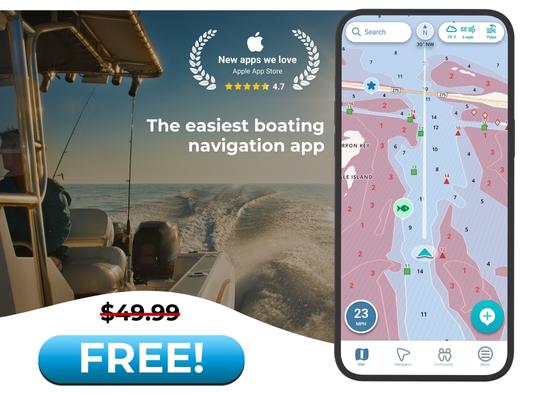Get Your Canada Boating
Licence Online!
Transport Canada–Approved Boater Safety Course for the Pleasure Craft Operator Card. BOATERexam.com® is a delegated provider for Transport Canada.
Transport Canada–Approved Boater Safety Course for the Pleasure Craft Operator Card. BOATERexam.com® is a delegated provider for Transport Canada.
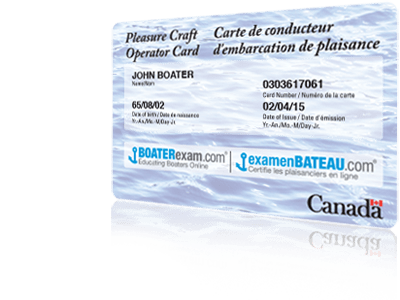
Get your Canada Boating License in
4 Easy Steps
Take your BOATERexam® course and be certified for life!
Step 1
Sign Up
Sign up for a Boaterexam® account, pay for the official course, and get started. It only takes a few minutes.
Step 2
Study & Pass the Online Course
Take the course on desktop, tablet or mobile. We automatically save your progress so you can learn at your own pace.
Step 3
Print Your Temp Card Immediately
Pass the online exam and print your temporary Pleasure Craft Operator Card immediately.
Step 4
Go Boating!
Hit the water! You're all set to legally operate a boat.
Over 2,000,000 boating students certified and counting:
BOATERexam.com has a TrustPilot rating of 4.7 out of 5 based on 17707 ratings and reviews.
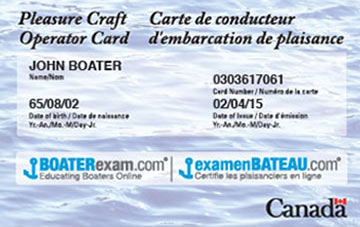
Who needs a Pleasure Craft Operator Card (PCOC) in Canada?
Anyone operating a motorized pleasure craft in Canada is required to obtain proof of education from a Transport Canada–approved course.
Lost? Damaged? Need Extras?
Order now!
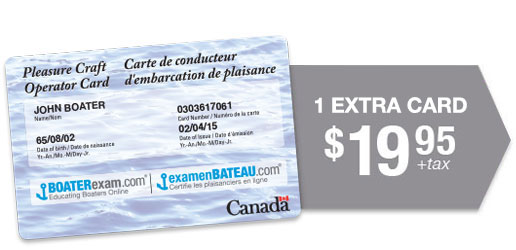
Ordering is easy!
To order a replacement card, go to ilostmycard.com.
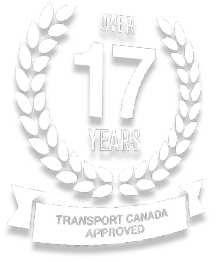
Transport Canada Approved,
Trusted Nationwide
BOATERexam.com® is Canada's most trusted provider of boating safety education and a Transport Canada approved course. Our boating license certification course is trusted by Canadians and recognized by over 50 U.S. States.
This official Canada boating safety course is approved by Transport Canada.
Get Certified!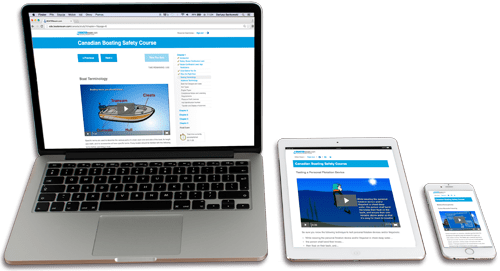
You control your
learning experience
From laptop to mobile phone, choose when and where you complete your course.
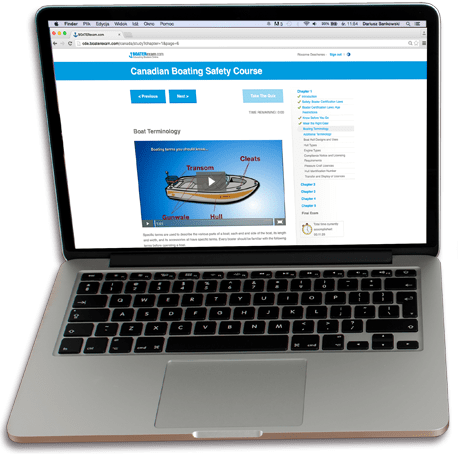
You control your
learning experience
From laptop to mobile phone, choose when and where you complete
your course.

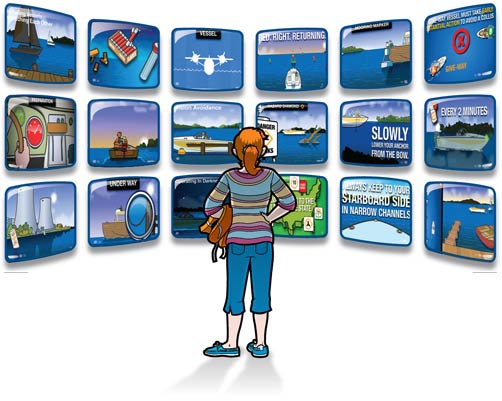
Illustrated questions
We found out a long time ago that people learn best when they can see what they're learning.
Shouldn't you be tested the same way? We think so. We illustrate every one of our quiz questions to help you get your boating licence.
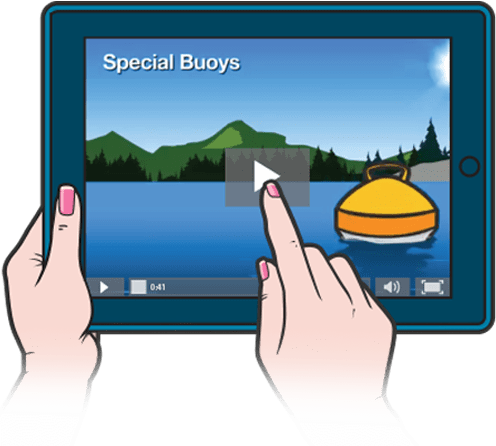
Hundreds of engaging videos
Engaging videos
BOATERexam.com® takes you out of the textbook and into the captain's seat.
Our course features tons of dynamic content, including hundreds of interactive and narrated animations. That means you aren't just reading your boating exam, you're listening, watching and engaging — which means you'll learn more, be a smarter boater and have more fun.
$59.95
Returning user? Log in here
Boating in Canada
With 202,080 km of coastline, Canada touts the longest coastline in the world. The Pacific Ocean sits to the west, the Atlantic Ocean to the east, the Arctic Ocean to the north, and the Great Lakes to the south. Canada is also home to over 31,752 lakes larger than three square miles, the boating options are truly endless in Canada.
Look for the best places to boat in: Alberta, British Columbia, Manitoba New Brunswick, Nova Scotia, Ontario, Saskatchewan, Newfoundland and Labrador, Northwest Territories, Nunavut, Prince Edward Island, Quebec, and Yukon.
To operate a personal watercraft in Canada, you need a license called a Pleasure Craft Operator Card (PCOC). To get your PCOC, you’ll need to take a boater education course approved by Transport Canada, such as BOATERexam. This course will help you understand your personal watercraft and stay safe on the water.
In addition to having a PCOC, there are some additional laws and regulations that you must learn and abide by while operating a PWC in Canada.
Wear a lifejacket
Canadian law requires everyone on board a PWC to wear a lifejacket or a personal floatation device. Be proactive and make sure you bring enough lifejackets for yourself and any passengers you may have.
Follow local regulations
Keep in mind that each region has its own speed limit, rules and regulations for PWC operators. Make sure to familiarize yourself with the law where you’ll be operating.
Stay alert
While operating a PWC, it’s important to keep a close eye on other boats and obstacles, including swimmers. It’s also essential to be aware of changing weather conditions.
We’re sure you’re excited to get out on the water, but before you get started, it’s important to know that anyone operating a motorized craft on Canadian waters must successfully complete a Transport Canada–approved boater safety course and obtain a Pleasure Craft Operator Card.
Now that you’re ready for the water, here are some of our top recommendations:
Haida Gwaii
Located off the coast of British Columbia, this remote archipelago is home to some of the most breathtaking scenery in Canada. Haida Gwaii’s many islands and fishing villages provide the perfect opportunity for exploring, as well as unmatched whale, sea lion and dolphin watching.
The Great Lakes
With stunning scenery and plenty of marinas and launch points, the five Great Lakes – Lake Superior, Lake Michigan, Lake Huron, Lake Erie and Lake Ontario – offer some of the best freshwater boating in the world. With the lakes holding 84% of the surface water of North America, you won’t run out of space for watersports.
The Rideau Canal
Connecting Ottawa to Kingston, the Rideau Canal is a historic waterway that offers a plethora of locks, quaint towns, and beautiful landscapes for boaters to explore. The only remaining slackwater canal from the 19th century, Rideau offers unparalleled views of historic structures.
Okanagan Lake
Located in British Columbia’s Okanagan Valley, with the city of Vernon at its north end, Penticton in the south, and Kelowna on its eastern shore, Okanagan Lake is known for stunning mountain and vineyard views. The region’s history and scenery make Okanagan Lake a great place to spend an afternoon – or a week.
Before getting on the water, always prioritize safety and be prepared by bringing all the proper equipment. Don’t forget lifejackets, communication devices, and any other safety equipment that’s required where you’re going. Finally, be sure to check weather and water conditions, as well as local regulations.
A Wavve of Savings
Get your first year FREE!
Complete your course and get the first year of Wavve Boating for FREE.
Learn MoreCanada Frequently Asked Boating Questions
Below are some common questions about safe boating rules & regulations.
Q.
What is the Pleasure Craft Operator Card (PCOC)?
A.
The PCOC is proof of competency that shows boaters understand how to operate a boat safely. This is achieved through taking the boater safety course online or in person and passing the final exam.
Q.
Do I need to have a drivers license to get a Pleasure Craft Operators Card?
A.
Q.
What is proof of operator competency in Canada?
A.
Proof of operator competency can take one of three forms:
- A Pleasure Craft Operator Card;
- Proof of having successfully completed a boating safety course in Canada prior to April 1, 1999; or,
- A completed rental-boat safety checklist.
A Pleasure Craft Operator Card is issued following the successful completion of an approved test. This proof of competency is the most common.
If you have taken a boating safety course prior to April 1, 1999, the certificate you obtained is a valid proof of operator competency. However, the certificate must clearly show that the course you took was taken in Canada and prior to April 1, 1999.
If you are renting a pleasure craft fitted with a motor you must complete a rental boat safety checklist. This will be considered your proof of competency and is valid for the duration of the rental period. The rental company will review the checklist with you.
Q.
Is the Pleasure Craft Operator Card the same as a Boating Licence?
A.
The PCOC does not expire and therefore is not called a licence. Only a PCOC is required to legally operate a motor-powered boat on Canadian waters.
Q.
How long is the Canada Pleasure Craft Operator Card good for?
A.
Q.
How long will it take for the Pleasure Craft Operator Card to arrive after I’ve passed the exam?
A.
Q.
Is the card good for life?
A.
Yes. The Pleasure Craft Operator Card is good for life with no annual fees.
Q.
How do I replace my Pleasure Craft Operator Card Card if I’ve lost it or it has been damaged?
A.
You can order a replacement card by clicking Lost your card? in the top menu or by contacting us at 1-866-688-2628 to order another card.
Q.
In which province is the Pleasure Craft Operator Card valid?
A.
The card is valid in each province.
Q.
Is there a minimum age requirement to receive the Pleasure Craft Operator Card?
A.
There is no minimum age requirement to take this online course.
Q.
Do I have to be a Canadian resident to get a Pleasure Craft Operator Card?
A.
Q.
How long does the course take?
A.
Q.
What happens if I don't pass the final exam?
A.

Need Help? Visit the BOATERexam.com® Help Center
The BOATERexam.com® Help Center is the place to find answers and solutions to your questions.
We've helped over 2 million people get certified online. So, we know what it takes.

